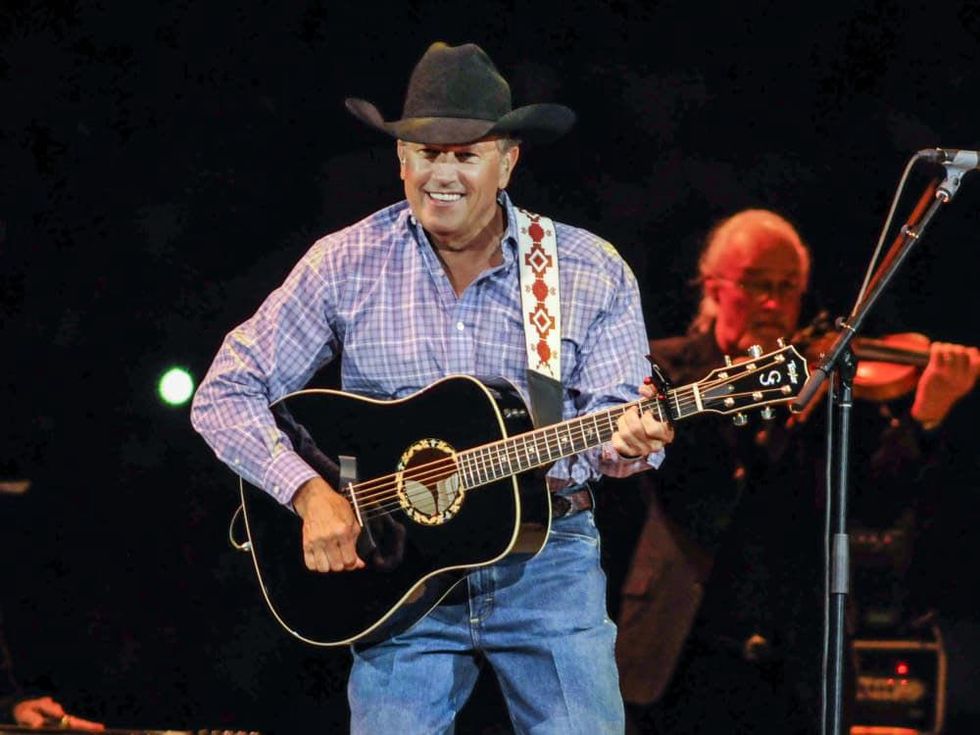Defiance, Texas
Austin's original bad boy Scott H. Biram is older, but no less rebellious
Scott H. Biram was born about 20 years too late for Austin’s outlaw country heyday. But the San Marcos native’s hell-raising hybrid of blues, punk, country, metal and ragged rock ‘n’ roll is clearly indebted to that era’s defiantly anti-commercial attitude. Even icons like Waylon Jennings, Johnny Cash, and Kris Kristofferson would have a hard time matching Biram’s vivacious one-man band energy.
Packing little more than a 1959 Gibson hollow-body guitar and an amplified stomp board, Biram transforms his live show into a rip-roaring sermon from what he calls the "First Church of Ultimate Fanaticism." His 10 self-recorded full-length albums — including last month’s Nothin’ But Blood on Bloodshot Records — are accurate representations of such vim and vigor.
"I love this town with all my heart, but I’m not sure I can find any good changes right now. I’m sitting here on Lamar looking at a condo."
But Biram’s career is couched in folklore: his love of Velcro shoes, his head-on collision with a semi-truck in 2003 (and the Continental Club set he played a month later with an IV in his arm), his 2004 SXSW quote upon taking the stage after Kristofferson ("They said that was a hard act to follow … I’m a hard act to follow motherf***ers!").
But as CultureMap’s recent interview with Biram indicated, this soon-to-be 40-year-old is friendly, fiery and damn funny, traits that certainly underlie his unruly music.
CultureMap: You spent an unusual amount of time at home this winter, Scott. Any reason why, particularly with a new album out in February?
Scott Biram: I got a new booking agent recently, and that threw off this record release tour by like a month. I usually take off December and most of January, but this year I took most of February off, too. It drove me crazy being home that long — longer than I’ve been home in a really long time.
CM: The new album, Nothin’ But Blood, contains standard venom-spitters like "Alcohol Blues" and "Only Whiskey," but also a few songs like "Slow & Easy" and "Never Comin' Home" that are, dare we say, tender.
SB: [Laughs] I’m not afraid of the word "tender." All of my records have a few of those songs. Everybody needs to take a breath, you know? Even on stage. Live, I tend to follow up the tender songs with the metal songs, just to make the metal songs more shocking and the softer songs sweeter. I’m actually putting out a live record here in a few months, which will show more of that. But on record, I don’t go for a theme or anything — I just go for who I am and what I do. And what I do is jump from genre to genre and tempo to tempo.
CM: Does that explain your wildly diverse fan-base?
SB: Yeah, and it’s obvious at the shows. There’ll be old folks and young kids and metal heads and hippies and rednecks and everything in between. I’m dedicated to teaching people who love country and hate heavy metal to open their minds — and vice versa. Most everyone likes the blues, though. That’s not a hard sell.
CM: You tour a lot in Europe, where a large fan-base of blues purists exists. Do you get good responses there?
SB: I’ve been to Europe 15 or 16 times, so I’d say so. It still blows my mind that I can sell out a club in Switzerland or Serbia. I had 350 people at my show in Belgrade last year, and I’d never even been there before. But as far as the blues purist thing goes, it’s funny when someone thinks I’m not playing "real blues" — what they consider "real blues" is contemporary, whitewashed, white-boy blues. Overproduced crap. It’s terrible.
CM: You’ve only got one show scheduled in Austin this spring, a record release party at Red 7 on March 19. Any particular reason why?
SB: I love playing in Austin, but we’re trying to rein it in so that we’re not doing it as much as we used to. I don’t want to wear out my welcome in my own hometown [laughs]. My friend Luke’s mom, Marcia Ball, once told us that you can either be famous outside Austin or in Austin — but you can’t be famous in both places. I made it my personal agenda to try and be famous in both places.
CM: Marcia might revise that sentiment now that Austin has grown so exponentially. Your thoughts?
SB: Well, I guess it’s all been downhill since they tore down the Armadillo [World Headquarters] in the early ‘80s [laughs]. And I’m only kinda joking … I love this town with all my heart, but I’m not sure I can find any good changes right now. I’m sitting here on Lamar looking at a condo. Burnet Road looks more like South Austin these days than South Lamar does. It’s too bad about the sound ordinance problems, too, but this town does treat its musicians as an asset. HAAM [Health Alliance for Austin Musicians] and the SIMS Foundation are definitely a plus. The festivals are getting a little crazy … but I’ll still attend ‘em [laughs].
CM: Do you think younger bands can succeed following the kind of strictly DIY route that you pursued?
SB: It’s definitely still an uphill battle, but it’s more possible now because of the Internet. When I first started, we didn’t even have email. You had to call a promoter at either 2 pm or 2 am. Now we have websites and all this Kickstarter stuff. The big question mark is, "Are record labels going to last?" "Is there even a need for them, or can everybody put out their own music?" Any band can do well on their own as long as they put their mind to it. A lot of people think checks and tour buses fall into your lap, but let me tell you — from my experience, that is definitely not the case. I learned a lot doing managing myself. Once I ended up with outside booking agents and labels, I knew what to expect and how to avoid getting ripped off.
CM: What were you listening to at home in Austin before you left on tour?
SB: All over the map. Old Muddy Waters one moment, Steely Dan the next ... I saw Steely Dan a couple of months ago and then turned around and saw Iron Maiden the next week. One contemporary band I enjoy is Goddamn Gallows. As a string band, they’re giving roots music a harder edge. Also, as an aspiring music producer and engineer, I don’t close myself off to crappy pop music — mostly just so I can analyze production techniques. I’m a lo-fi musician that goes for a gritty sound, but I want the knowledge of how to make pop music clean and pristine. Not that I approve of pop music [laughs].



